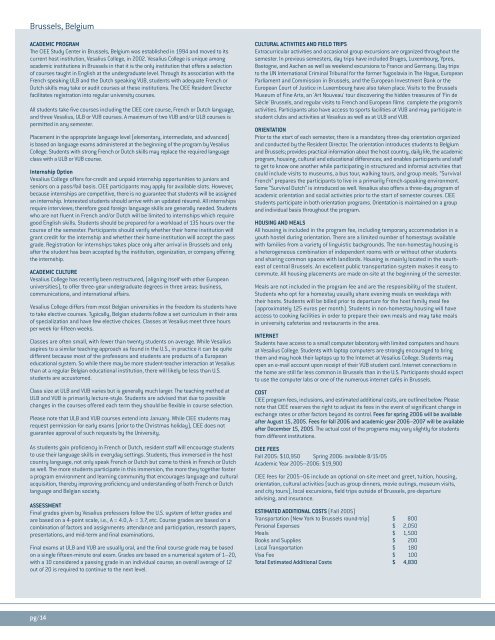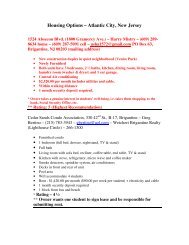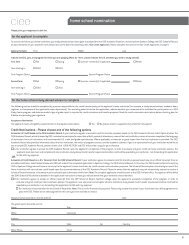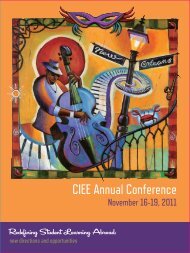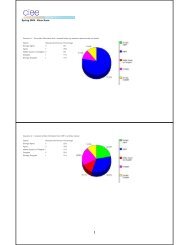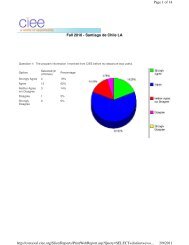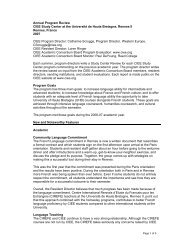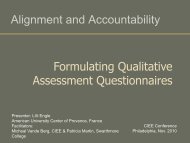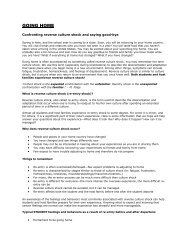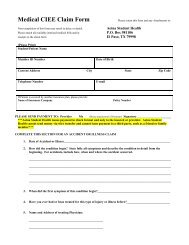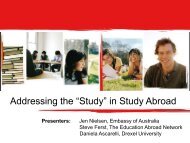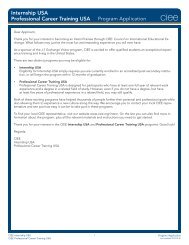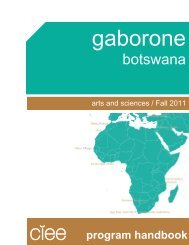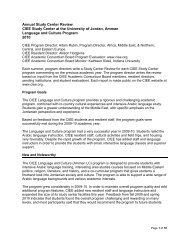studyeurope - Council on International Educational Exchange
studyeurope - Council on International Educational Exchange
studyeurope - Council on International Educational Exchange
- No tags were found...
Create successful ePaper yourself
Turn your PDF publications into a flip-book with our unique Google optimized e-Paper software.
Brussels, BelgiumACADEMIC PROGRAMThe CIEE Study Center in Brussels, Belgium was established in 1994 and moved to itscurrent host instituti<strong>on</strong>, Vesalius College, in 2002. Vesalius College is unique am<strong>on</strong>gacademic instituti<strong>on</strong>s in Brussels in that it is the <strong>on</strong>ly instituti<strong>on</strong> that offers a selecti<strong>on</strong>of courses taught in English at the undergraduate level. Through its associati<strong>on</strong> with theFrench speaking ULB and the Dutch speaking VUB, students with adequate French orDutch skills may take or audit courses at these instituti<strong>on</strong>s. The CIEE Resident Directorfacilitates registrati<strong>on</strong> into regular university courses.All students take five courses including the CIEE core course, French or Dutch language,and three Vesalius, ULB or VUB courses. A maximum of two VUB and/or ULB courses ispermitted in any semester.Placement in the appropriate language level (elementary, intermediate, and advanced)is based <strong>on</strong> language exams administered at the beginning of the program by VesaliusCollege. Students with str<strong>on</strong>g French or Dutch skills may replace the required languageclass with a ULB or VUB course.Internship Opti<strong>on</strong>Vesalius College offers for-credit and unpaid internship opportunities to juniors andseniors <strong>on</strong> a pass/fail basis. CIEE participants may apply for available slots. However,because internships are competitive, there is no guarantee that students will be assignedan internship. Interested students should arrive with an updated résumé. All internshipsrequire interviews; therefore good foreign language skills are generally needed. Studentswho are not fluent in French and/or Dutch will be limited to internships which requiregood English skills. Students should be prepared for a workload of 135 hours over thecourse of the semester. Participants should verify whether their home instituti<strong>on</strong> willgrant credit for the internship and whether their home instituti<strong>on</strong> will accept the passgrade. Registrati<strong>on</strong> for internships takes place <strong>on</strong>ly after arrival in Brussels and <strong>on</strong>lyafter the student has been accepted by the instituti<strong>on</strong>, organizati<strong>on</strong>, or company offeringthe internship.ACADEMIC CULTUREVesalius College has recently been restructured, (aligning itself with other Europeanuniversities), to offer three-year undergraduate degrees in three areas: business,communicati<strong>on</strong>s, and internati<strong>on</strong>al affairs.Vesalius College differs from most Belgian universities in the freedom its students haveto take elective courses. Typically, Belgian students follow a set curriculum in their areaof specializati<strong>on</strong> and have few elective choices. Classes at Vesalius meet three hoursper week for fifteen weeks.Classes are often small, with fewer than twenty students <strong>on</strong> average. While Vesaliusaspires to a similar teaching approach as found in the U.S., in practice it can be quitedifferent because most of the professors and students are products of a Europeaneducati<strong>on</strong>al system. So while there may be more student-teacher interacti<strong>on</strong> at Vesaliusthan at a regular Belgian educati<strong>on</strong>al instituti<strong>on</strong>, there will likely be less than U.S.students are accustomed.Class size at ULB and VUB varies but is generally much larger. The teaching method atULB and VUB is primarily lecture-style. Students are advised that due to possiblechanges in the courses offered each term they should be flexible in course selecti<strong>on</strong>.Please note that ULB and VUB courses extend into January. While CIEE students mayrequest permissi<strong>on</strong> for early exams (prior to the Christmas holiday), CIEE does notguarantee approval of such requests by the University.As students gain proficiency in French or Dutch, resident staff will encourage studentsto use their language skills in everyday settings. Students, thus immersed in the hostcountry language, not <strong>on</strong>ly speak French or Dutch but come to think in French or Dutchas well. The more students participate in this immersi<strong>on</strong>, the more they together fostera program envir<strong>on</strong>ment and learning community that encourages language and culturalacquisiti<strong>on</strong>, thereby improving proficiency and understanding of both French or Dutchlanguage and Belgian society.ASSESSMENTFinal grades given by Vesalius professors follow the U.S. system of letter grades andare based <strong>on</strong> a 4-point scale, i.e., A = 4.0, A- = 3.7, etc. Course grades are based <strong>on</strong> acombinati<strong>on</strong> of factors and assignments: attendance and participati<strong>on</strong>, research papers,presentati<strong>on</strong>s, and mid-term and final examinati<strong>on</strong>s.Final exams at ULB and VUB are usually oral, and the final course grade may be based<strong>on</strong> a single fifteen-minute oral exam. Grades are based <strong>on</strong> a numerical system of 1–20,with a 10 c<strong>on</strong>sidered a passing grade in an individual course; an overall average of 12out of 20 is required to c<strong>on</strong>tinue to the next level.CULTURAL ACTIVITIES AND FIELD TRIPSExtracurricular activities and occasi<strong>on</strong>al group excursi<strong>on</strong>s are organized throughout thesemester. In previous semesters, day trips have included Bruges, Luxembourg, Ypres,Bastogne, and Aachen as well as weekend excursi<strong>on</strong>s to France and Germany. Day tripsto the UN Internati<strong>on</strong>al Criminal Tribunal for the former Yugoslavia in The Hague, EuropeanParliament and Commissi<strong>on</strong> in Brussels, and the European Investment Bank or theEuropean Court of Justice in Luxembourg have also taken place. Visits to the BrusselsMuseum of Fine Arts, an 'Art Nouveau' tour discovering the hidden treasures of 'Fin deSiècle' Brussels, and regular visits to French and European films complete the program’sactivities. Participants also have access to sports facilities at VUB and may participate instudent clubs and activities at Vesalius as well as at ULB and VUB.ORIENTATIONPrior to the start of each semester, there is a mandatory three-day orientati<strong>on</strong> organizedand c<strong>on</strong>ducted by the Resident Director. The orientati<strong>on</strong> introduces students to Belgiumand Brussels; provides practical informati<strong>on</strong> about the host country, daily life, the academicprogram, housing, cultural and educati<strong>on</strong>al differences; and enables participants and staffto get to know <strong>on</strong>e another while participating in structured and informal activities thatcould include visits to museums, a bus tour, walking tours, and group meals. “SurvivalFrench” prepares the participants to live in a primarily French-speaking envir<strong>on</strong>ment.Some “Survival Dutch” is introduced as well. Vesalius also offers a three-day program ofacademic orientati<strong>on</strong> and social activities prior to the start of semester courses. CIEEstudents participate in both orientati<strong>on</strong> programs. Orientati<strong>on</strong> is maintained <strong>on</strong> a groupand individual basis throughout the program.HOUSING AND MEALSAll housing is included in the program fee, including temporary accommodati<strong>on</strong> in ayouth hostel during orientati<strong>on</strong>. There are a limited number of homestays availablewith families from a variety of linguistic backgrounds. The n<strong>on</strong>-homestay housing isa heterogeneous combinati<strong>on</strong> of independent rooms with or without other studentsand sharing comm<strong>on</strong> spaces with landlords. Housing is mainly located in the southeastof central Brussels. An excellent public transportati<strong>on</strong> system makes it easy tocommute. All housing placements are made <strong>on</strong>-site at the beginning of the semester.Meals are not included in the program fee and are the resp<strong>on</strong>sibility of the student.Students who opt for a homestay usually share evening meals <strong>on</strong> weekdays withtheir hosts. Students will be billed prior to departure for the host family meal fee(approximately 125 euros per m<strong>on</strong>th). Students in n<strong>on</strong>-homestay housing will haveaccess to cooking facilities in order to prepare their own meals and may take mealsin university cafeterias and restaurants in the area.INTERNETStudents have access to a small computer laboratory with limited computers and hoursat Vesalius College. Students with laptop computers are str<strong>on</strong>gly encouraged to bringthem and may hook their laptops up to the Internet at Vesalius College. Students mayopen an e-mail account up<strong>on</strong> receipt of their VUB student card. Internet c<strong>on</strong>necti<strong>on</strong>s inthe home are still far less comm<strong>on</strong> in Brussels than in the U.S. Participants should expectto use the computer labs or <strong>on</strong>e of the numerous internet cafés in Brussels.COSTCIEE program fees, inclusi<strong>on</strong>s, and estimated additi<strong>on</strong>al costs, are outlined below. Pleasenote that CIEE reserves the right to adjust its fees in the event of significant change inexchange rates or other factors bey<strong>on</strong>d its c<strong>on</strong>trol. Fees for spring 2006 will be availableafter August 15, 2005. Fees for fall 2006 and academic year 2006–2007 will be availableafter December 15, 2005. The actual cost of the programs may vary slightly for studentsfrom different instituti<strong>on</strong>s.CIEE FEESFall 2005: $10,950 Spring 2006: available 8/15/05Academic Year 2005–2006: $19,900CIEE fees for 2005–06 include an opti<strong>on</strong>al <strong>on</strong>-site meet and greet, tuiti<strong>on</strong>, housing,orientati<strong>on</strong>, cultural activities (such as group dinners, movie outings, museum visits,and city tours), local excursi<strong>on</strong>s, field trips outside of Brussels, pre-departureadvising, and insurance.ESTIMATED ADDITIONAL COSTS (Fall 2005)Transportati<strong>on</strong> (New York to Brussels round-trip) $ 800Pers<strong>on</strong>al Expenses $ 2,050Meals $ 1,500Books and Supplies $ 200Local Transportati<strong>on</strong> $ 180Visa Fee $ 100Total Estimated Additi<strong>on</strong>al Costs $ 4,830pg/14


